Issues with AT&T customers contacting us. Some AT&T customers are having trouble calling us, "the listed phone number is not in service." Please read more here


The philosophy of the Structural Heart Clinic mirrors the integrated team approach taken by the rest of the departments at the South Denver Heart Center. Guests of the clinic will receive a multi-disciplinary approach to designing their care plan.
With advanced minimally invasive therapies, our Structural Heart Clinic at South Denver Cardiology arranges care around four different heart valve procedures. The Transcatheter Aortic Valve Replacement (TAVR) procedure is for patients that need to have their aortic valve replaced because they’ve developed a condition known as severe aortic stenosis, and have symptoms related to the bad valve. MitraClip is a procedure that can help patients with moderate-severe mitral regurgitation, which might not do well with open-heart surgery. Left Atrial Appendage Occlusion procedures can minimize stroke risk for patients that can’t tolerate being on blood thinners for the long-term. Patent Foramen Ovale (PFO) closure can help reduce future stroke risk in certain patients by closing a hole between the two upper chambers of the heart. Research shows that in some cases of stroke a PFO can be related. Closure of a PFO may show the reduction of migraine headaches in certain patients.
The Structural Heart Clinic allows guests to be able to set up any supporting care, diagnostic testing, and follow up with the same doctors and nurses in the same location.
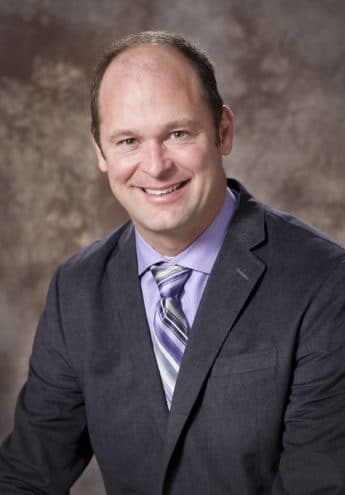 Lee MacDonald, M.D.
Lee MacDonald, M.D. Sean A. Enkiri, M.D.
Sean A. Enkiri, M.D.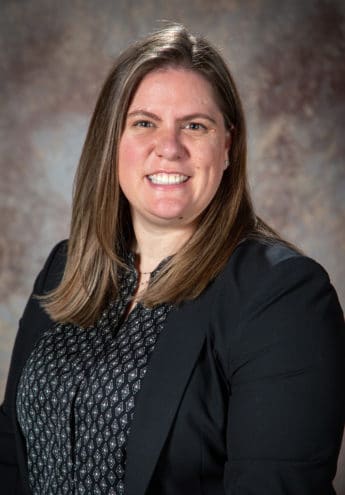 Erin Unger, M.D.
Erin Unger, M.D.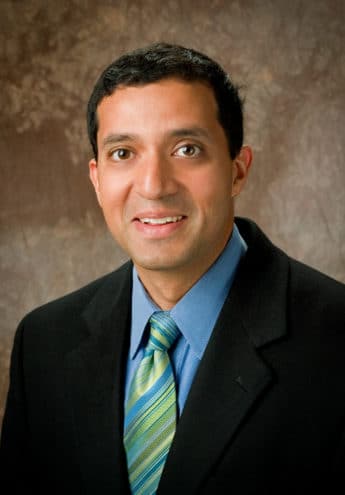 Sri Sundaram, M.D.
Sri Sundaram, M.D.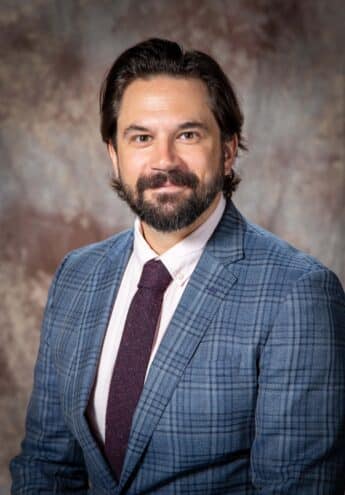 Nicholas Palmeri, MD
Nicholas Palmeri, MD Whitney Groth
Whitney Groth Shari Nieman
Shari Nieman Kristi Swim
Kristi SwimTAVR-Patient Information Guide
View PDFThe Structural Heart Clinic at the South Denver Heart Center (SDHC) specializes in the diagnosis and treatment of severe Aortic Stenosis.
This approach to patient care gets everything a guest of the SDHC will need in one place. They will be able to discuss treatment options that may include surgical, medication, or the groundbreaking Transcatheter Aortic Valve Replacement (TAVR) program. TAVR is a procedure that is performed through a catheter that is inserted into the patient’s groin, which provides treatment for patients with aortic stenosis considered too high of a risk for open-heart surgery. The procedure is similar to a cardiac stent. Instead, a stent-like device is deployed across the aortic valve creating a wider opening. TAVR received FDA approval in the fall of 2011. The physicians of the South Denver Heart Center in collaboration with Colorado Cardiovascular Surgical Associates can offer their patients this groundbreaking technology.
In this video, Dr. Lee MacDonald, an interventional cardiologist at South Denver Cardiology, discusses aortic valve disease and the use of TAVR.
Dr. Lee MacDonald, with South Denver Cardiology, discusses the causes, symptoms, and treatment for Aortic Stenosis. Dr. MacDonald also talks about the new technology in repairing the Aortic Valve with TAVR-Transcatheter Aortic Valve Replacement. Dr. MacDonald is head of the TAVR clinic at South Denver Cardiology.
Our 100th case! December 2017 (Dr. Lee MacDonald & Dr. Sean Enkiri)
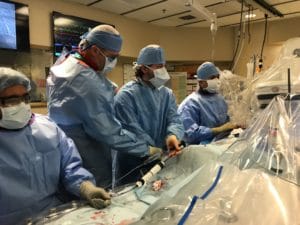
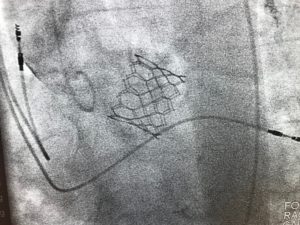
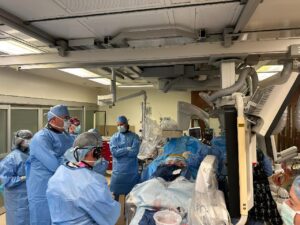 Congratulations to AdventHealth Littleton and South Denver Cardiology for performing the first Transcatheter Aortic Valve Replacement (TAVR) procedure at Littleton Hospital. South Denver Cardiology is moving its extensive, almost a decade-old, very successful TAVR program from Swedish Medical Center to AdventHealth Littleton. The first cases were done Wednesday at Littleton. Dr. Sean Enkiri, Dr. Lee MacDonald, and surgeon Dr. Melissa Levack performed the first cases on Wednesday, the 20th, at Littleton Hospital. South Denver Cardiology continues to offer the most comprehensive cardiac treatment for all patients. In collaboration with Advent Health, this is the beginning of a new Cardiac Institute with a coming dedicated Cardiovascular Tower at AdventHealth Littleton Hospital, which is currently under construction with an anticipated opening in early summer 2025.
Congratulations to AdventHealth Littleton and South Denver Cardiology for performing the first Transcatheter Aortic Valve Replacement (TAVR) procedure at Littleton Hospital. South Denver Cardiology is moving its extensive, almost a decade-old, very successful TAVR program from Swedish Medical Center to AdventHealth Littleton. The first cases were done Wednesday at Littleton. Dr. Sean Enkiri, Dr. Lee MacDonald, and surgeon Dr. Melissa Levack performed the first cases on Wednesday, the 20th, at Littleton Hospital. South Denver Cardiology continues to offer the most comprehensive cardiac treatment for all patients. In collaboration with Advent Health, this is the beginning of a new Cardiac Institute with a coming dedicated Cardiovascular Tower at AdventHealth Littleton Hospital, which is currently under construction with an anticipated opening in early summer 2025.
Mitral regurgitation is the most common heart valve disorder in the United States. Mitral regurgitation is a condition when the leaflets of the valve do not close properly, and blood flows backward into the upper chamber. Over time, this condition can not only create symptoms but also produce abnormal heart rhythms, clots or, in many cases, heart failure. The usual treatment for mitral regurgitation is open-heart surgery to repair or replace the leaky valve. However, surgery is not for everyone. When open-heart surgery is too risky, the MitraClip device may be a good alternative. During this procedure, physicians thread a catheter from the leg to the heart and place a MitraClip device in order to decrease the backflow of blood. This clip allows the mitral valve to close more completely, helping to restore normal blood flow to the heart. Often, many times patients go home the next day. Multiple studies have shown that the MitraClip has been a safe and effective technique helping many patients who were once considered high-risk surgical patients.
In the video, learn more about mitral valve disease and the treatment of mitral regurgitation with the MitraClip.
Denver Cardiology is a state-of-the-art facility using the latest minimally invasive procedures to treat heart disease. MitraClip is a new minimally invasive treatment for Severe Mitral Regurgitation. Cardiologist Lee MacDonald, MD explains MR and the MitraClip procedure performed by South Denver Cardiology physicians.
South Denver Cardiology Associates is pleased to offer our patients a new and innovative treatment for non-valvular atrial fibrillation (AFib). Until now, patients with this condition have relied on blood thinners or anticoagulants, such as warfarin, to help manage their risk of stroke. While effective, these medications can cause undesired side effects.
Now there is an alternative – the WATCHMAN Implant.
This permanent implant may reduce stroke risk for a lifetime in people with AFib not caused by a heart valve problem. What’s more, WATCHMAN can reduce the risk of bleeding that comes with Warfarin (also known as Coumadin®) and eliminates the regular blood tests and food-and-drink restrictions that come along with it.
In a clinical trial, 9 out of 10 people were able to stop taking warfarin just 45 days after the WATCHMAN procedure.
The one-time, procedure is performed by the cardiologists with South Denver Cardiology. Once implanted, it does not require replacement. The procedure takes about one hour and patients typically go home the next day.
To find out more about the WATCHMAN procedure watch the video below, or call the Structural Heart Clinic at 303-738-3098
In this video, Dr. Lee MacDonald discusses the Watchman device, a new and innovative treatment for non-valvular atrial fibrillation (AFib). Watchman is a permanent implant that offers an alternative to the lifelong use of blood thinners and may reduce the risk of stroke.
PFO is a small hole between the top two chambers in the heart that didn’t close at birth. The American Heart Association says that about 25 percent of the general population has a PFO and most of these people will never know they have one. 40-50 percent of patients who have strokes for an unknown cause may have a PFO. PFO’s are not usually investigated unless patients experience severe migraines, Transient Ischemic Attack (TIA), or stroke. The only way to find out if you have a PFO is a specialized echocardiogram.
The cardiologists in the Structural Heart Clinic at South Denver Cardiology are leaders in the evaluation, treatment, and repair of PFO’s. If you have questions or symptoms of PFO, contact your primary care provider or the Structural Heart Clinic at 303-738-3098
In this video, Dr. Lee MacDonald, explains holes in the heart, are they normal, or do they need to be treated? See what cutting edge technology SDCA uses to fix them.
Lee MacDonald, MD is an interventional cardiologist with South Denver Cardiology Associates and briefly describes the link between stroke and PFO (Patent Foramen Ovale).
Dr. Lee MacDonald with South Denver Cardiology discusses if there is a connection between Patent Foramen Ovale (PFO) and Migraines.